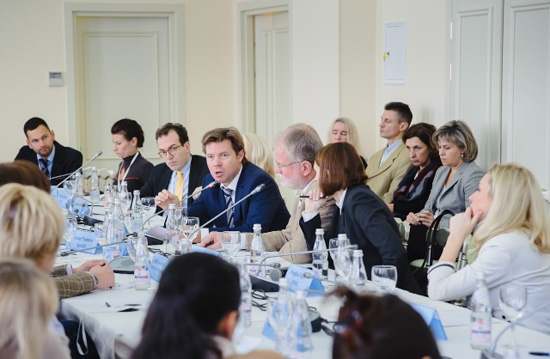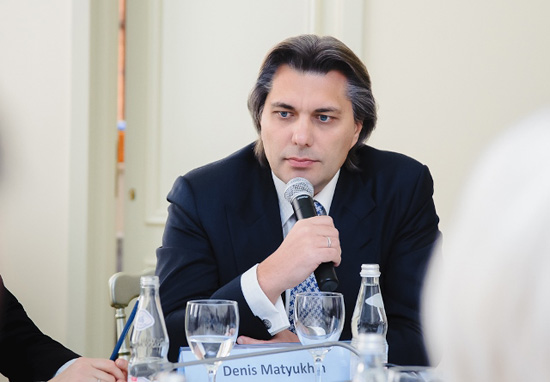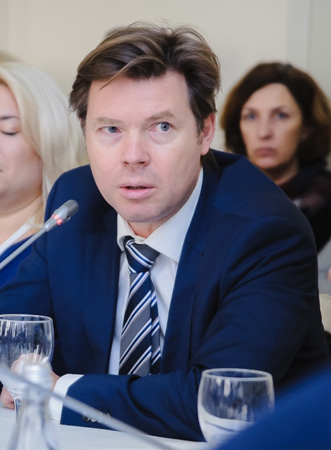Agent commission cut by airlines: causes, reactions, market forecasts
Starting from June 1st, Aeroflot has set the new size of basic agent commission — 4%, making it universal for all service classes. It bears reminding that earlier the carrier’s agent partners got 7% for economy class and 9% for business class sales. Experts forecast that in the foreseeable future all large Russian air market players will cut on agent commission significantly and then eliminate it altogether.
On September 27th, BuyingBusinessTravel, media sponsor of the Russian Association of Business Travel held a panel discussion on «Commission cut», devoted to the reduction of agent commission and its elimination by air carriers. The event that took place in the The Garden Ring hotel with the support of ABT gathered the leading business travel experts from «Aero Club» (BCD Travel Russia), Continent Express, ZCTS-EGENCIA Russia, HRG Russia and others, representatives of Aeroflot, Air Berlin, Turkish Airlines and corporate buyers. The panel discussion was moderated by Winfried Barczitis, individual consultant. The speakers and the participants discussed all burning questions connected with the change of financial relations between air carriers and travel agencies.

The process of commission reduction and its termination started in the middle of 90s in the USA on the initiative of the «Big Three» American carriers — American Airlines, Delta Airlines and United Airlines who accounted for 60% of domestic flights. Since then many countries have joined the process, and the global 2008 financial crisis increased the speed of the process dramatically: agent commission was totally eliminated by British Airways, Lufthansa, Air Canada, Air France, KLM, Finnair, SWISS, Continental Airlines, Japan Airlines, Qatar Airways, Singapore Airlines. Some few foreign companies, mainly Asian and Middle East, still carry out commission payments.
As for Russian air carriers, Transaero and Utair press services did not give any comments either on Aeroflot’s actions or on their own policy or future plans regarding agent commission. Ural Airlines stated that «relations between the air carrier and its agents are commercial confidentiality and can not be disclosed». S7 said that the company’s basic commission now amounted to 5% and could be as low as 0,1% for certain destinations. «The main aim of the commission cut is cost cutting, — the press service stressed. — The airline’s revenues have been growing slower than its costs for several years already, so cost cutting programs have become the necessary condition of the industry’s survival». S7 representatives also stressed that «western air carriers had eliminated agent commission long before and agents now earned their revenues by charging client fees only».
Aeroflot press service announced that the air carrier was not planning to cut the agent commission to zero: «At the moment a new system of agent motivation is under development, it will be interesting for the market. Russian and foreign agents will be duly informed about all changes in the system and the terms of its introduction».
According to expert opinion, the Russian air passenger market lags behind the western market by 10 years approximately in terms of air carriers’ relations with travel agencies. Up to mid 90s American and European air carriers paid approximately 9% to their partner agencies, and even offered «supercommission», when agencies received another 2% if they sold tickets of a particular airline, in other words, if they lobbied its interests and contributed to passenger loyalty. Thus TMCs` net income amounted to
Such air carriers` generosity was explained by the fact that the market had not completely taken shape and was not shared between large players. In those conditions it was agent commission that was the key instrument of sales promotion: airlines had to expand and strengthen their market positions by developing their distribution network. It is next to impossible to open your own agency or sales office in every remote part of the country, so at a certain stage it was decided to resort to intermediary services — agents, who should be attracted financially.
At some time agents and TMCs started speculating on their commission revenue and returning part of their income to their clients
This is how the commission cut process started, although some airlines have retained bonus schemes that look more like special marketing funds and programs. The same expert forecast is for Russian air carriers.
TMCs met Aeroflot’s commission cut with a mixed reception. No doubt, the most part assessed the step as negative realizing the scale of their financial losses and worsening client attitude because of extra fees. But some regard this measure as positive from the point of view of strategic development and speak about the future travel market recovery and growing competition. Moreover, many experts anticipated the commission cut and were getting prepared to it long before it really took place.
«In my opinion, it should have happened much earlier. Probably, after the crisis, in

As for Mr Matioukhin, he is sceptic about the scheme Aeroflot is planning to introduce to boost its sales: «As for my company, it is impossible to achieve a 45% growth rate with a maximum benefit of 4%. In general, it is very hard for large agencies with a $300 million annual turnover, — he said at BBT-Russia panel discussion. — And simultaneously the airline has the same conditions for all travel agencies. If we translate the scale that the airline offers us for keeping up sales and business volume etc, into real money, in some cases monthly difference may amount to 120 thousand roubles. Do you think this sum can encourage anyone? If we speak about employees — yes, but as for agencies — of course not».
Many experts suppose air carriers will not benefit much by the commission cut. The commission decrease in order to minimize agent costs, one of the key sales channels, cannot be deemed absolutely feasible, as these costs are not on top of air carriers’ budgets. «If we take audit results of Aeroflot’s budget carried out by the Audit Chamber of the Russian Federation, which is public information, you won’t see a single percent of agent costs there. There are „Other“ i.e. general costs there, that account for 4% of total costs only», — Stanislav Kostyashkin, general director of Continent Express business travel agency told the participants of the panel discussion.

In general, commission cut can not solve airlines’ financial problems or save them from bankruptcy. Besides, you can not reject TMC services at all, as well as GDS. «Some airlines do switch to direct sales, but it is just another sales channel for any company, — Mr Kostyashkin notes. — Nowadays the process is under way in western countries as well as in the USA, the role of TMCs is returning to its previous position». Continent Express director stresses that European and American air carriers who are present on the Russian market cut their internal costs in the first turn, for example costs of office rental in the centre of Moscow, and only then started dealing with minor expenses like agent commission. So why did Aeroflot decide to cut on commission? I will lift the veil — because the Audit Chamber and the Federal Anti-Monopoly Service called on it. — Mr Kostyashkin says. — The company’s fares on some destinations are twice as high as average market fares«.
According to Svetlana Morozova, marketing director of ZCTS-EGENCIA Russia, a business travel agency, Aeroflot already indirectly informed the market about the future commission cut several years ago. Other travel agency representatives also remark that Aeroflot’s measures did give the market a good shock, but were not a surprise for them. «Aeroflot’s and other air carriers’ commission cut was an anticipated and a predictable step, and we have long been ready for it, says Galina Barykina, marketing & PR manager of the Russian office of FCm Travel Solutions, an international TMC. First, it is not the first commission cut by the company, a similar attempt was made in 2004, but then commission payments returned. But the main thing is that the world practice consists in non-commission financial schemes: western airlines eliminated agent fees long ago and customer relations are mainly based on transaction fees. As a matter of fact, the last 10 years of business travel development in Russia have shown gradual recognition and acceptance of transaction fees as the financial model of cooperation between corporations and TMCs».
According to experts, the commission cut by Aeroflot will not affect its competitiveness. Moreover, the airline representatives are even facing growth in average flight occupancy — from 64% to 75%. This market will be influenced by Aeroflot, as it is the main carrier, — Mr Kostyashkin supposes. — The others will follow its course«. Many travel experts explain the situation by the fact that Aeroflot has a virtually monopolistic position on the low competitive market: the company’s share in its client TMCs` flights is
TMCs were the first to face the commission cut attack, and they can be considered the most affected party. «Aeroflot’s new rate does not cover our services costs, so we were forced to introduce new fees» — Denis Matioukhin says. He stressed that those events took place right before autumn, a high season for TMCs. «So all our future revenues will be suspended till March or April, as our next high season falls into these months», Mr Matioukhin adds.
It should be admitted, that many market participants are against a gradual commission cut at all. «The worst thing about this situation is the fact that the commission was not totally eliminated, it was just reduced, — Ms Morozova says. — It does not seem to be much at first sight, some 3% for economy class and 5% for business class. Besides, the airline decided to set zero commission for flights departing from outside Russia. That is, if a client goes from Paris to Moscow with Aeroflot, we do not get anything. Besides, this fact was not made public properly, it was just mentioned, and this division was not announced anywhere.
In the opinion of Marina Krechetnikova, administrative director of Japan Tobacco International (JTI), non-transparent and non-controlled scales of agent fees, especially their dependence on the place of departure are key arguments against transitional schemes of commission decrease by the company. She also considers a drawback signing double agreements on intermediate commission and on its total elimination, as well as the possible onset of dumping and the absence of fair competition.
Corporate buyers have turned out to be worse prepared to the commission cut, although many of them admit that they were warned by their TMCs against a possible rise in transaction fees. Maria Aleksandrova, travel specialist in Johnson & Johnson Medical Russia, says that the company received a series of letters from their travel service provider in due time: «Our provider informed us that he was suffering huge expenses and had to raise our transaction fee».
In general, business travel customers give negative comments on Aeroflot’s commission cut, given that agreement renegotiation and introduction of extra service fees (or the increase in existing ones) influence corporate budgets directly. «No doubt, such changes are bound to affect corporate travel budgets, — Anastasya Trofimova, business travel service director in Vimpelcom, stresses. — So now travel management is becoming really important for all the companies. For the past half a year we have taken a series of measures aimed to optimize business trip costs. In particular, we try to get large discounts from airlines by accumulating all the company’s flights and by concluding global agreements».
«A certain amount of travel expenses was budgeted, and we did not expect it to grow, Maria Aleksandrova notes. — Our provider said he was thinking about the ways to compensate for our losses and was ready to offer us a special program for booking and making reservations free of charge. This is now the aim of the purchase policy: to look for ways to minimize our own losses, to agree on extra services with the agency». According to Ms Aleksandrova, their company’s budget was not going to be overhauled: «We will do saving as a separate program: we have already concluded trilateral agreements in Russia, bargained for advantageous hotel prices. This is where we can save». Besides, Johnson & Johnson Medical Russia is trying to introduce new technologies, to reduce the number of foreign business trips and to replace them with conference calls.
In the meantime, it is the commission cut that forces agencies that are already under harsh conditions to find new ways of building their relationship with clients, to optimize costs, offer new services and an advanced business strategy — i. e. to follow brand new or rarely used development patterns. One of the key options for modern travel agencies consists in using online booking tools. It is explained by two new factors — active development of technologies, including mobile, and growing independence of business travellers, who prefer to make decisions about booking hotels and air tickets individually.
In the opinion of Denis Matioukhin, the shift of all client services only to online booking tools (OBT) will lead to a considerable reduction in TMCs` net costs. «If a client uses a fully functional online booking system, the amount of our fees will change notably». It should be noted, that the demand for OBT is high: this system is used by approximately 90% of corporate clients of ZCTS-EGENCIA Russia, which was the first to offer online solutions on the Russian market.
Nevertheless, experts point to the problem, that this service is not fully functional, in fact, i.e. the last phase of the cycle is still controlled by a professional. «The only problem we are facing today is some kind of „fear to press the final button“ in order to book a trip, Mr Matioukhin says. Until we persuade them to do that — issue a ticket or process a voucher etc, our costs will be on the previous level». General director of «Aero Club» brings the example of his colleagues from Saint Petersburg, who almost forced their clients to use online booking: «Some agencies announced, that it was the only way of their functioning, and it worked in the end».
Another way to cut TMCs` costs is to move their offices from regions with high rent rates to regions with cheaper manpower. «But then, unfortunately, other problems arise — both administration and service quality, Mr Matioukhin remarks. Because, say, in Saratov or Samara we can hardly find a big number of professional agencies that can give you expert advice».
And finally, one of the most efficient and modern ways, according to experts, is dividing TMCs` offer into separate services. You can thus not only reduce costs, but also improve your client focus and offer the customer the services he really needs, and not all inclusive. «A business travel agency’s costs amount to 7% on average, and they must be reimbursed for by someone, Mr Kostyashkin explains. — If the airline does not pay us, we charge corporate clients. But we propose to divide this sum in the same way airlines did. Our relations with client will follow the same model».
Here general director of Continent Express brings Great Britain and the USA as an example, where local TMCs offer their clients some kind of a service menu: ticket issuing has one fare, data collection — a second, implementation — a third, 24 hour online support — a fourth and so on. As Mr Kostyashkin says, Britain formed a business model of paying for the time consumed long ago: «There they do not have travel agents, they have travel consultants. That is, they do net sell tickets, they sell the agency’s time. And the transaction fee is the measure of this time».
As it was mentioned before, many market participants are more likely to consider the ongoing changes of the financial relations between suppliers and TMCs as positive. «If Aeroflot eliminates commission at all, travel agencies will not speculate on their prices and share their commission with clients, Svetlana Morozova supposes. It will give everyone equal rights. It is important for the client to understand that he does not have to agree to everything the agency offers, he should monitor the market, follow up and check information».
To sum it up, we can say that the struggle between TMCs for corporate clients has never been as intense as now. And the winner will be the one who will be able to avoid a common rise in service fees and to offer its clients high service standards and a wide range of services.
Vlada Stekanova (http://buyingbusinesstravel.com.ru/)